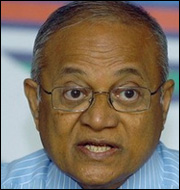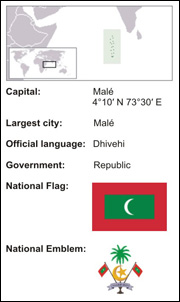
Wind of Change in Maldives
[TamilNet, Wednesday, 29 October 2008, 07:14 GMT]
As the counting is over for the elections that took place in Maldives on Tuesday, Mr. Mohamed Nasheed, popularly known 'Anni' has secured 54.21 percent of votes and is expected to assume power as president of the republic on November 11th. Mr. Maumoon Abdul Gayoom, the present incumbent ruling the country for 30 years since 1978 trailed behind with 45.79 percent. The voter turnout in the first ever elections in that country based on multi party system was a very high 86.58 percent.
Of the 209,294 eligible voters, 179,343 voted. Anni received 97,222 votes and Gayoom, 82,121.
Since none of the bunch of candidates failed to secure more than 50 percent in the elections that took place on the 8th of this month, the second round was called for on Tuesday between the first two candidates. In the first round, Gayoom secured 40 percent and Anni, 25 percent.
The elections were highly transparent, insisting on counting the votes within an hour after sealing the boxes and not removing them for counting centres. Party representatives were present during counting. Overseas voting was permitted in Trivandrum (Thiruvananthapuram), capital of Kerala, India, Colombo, Singapore, Kuala Lumpur, and in London, in the diplomatic missions of Maldives.
Hundreds of Maldivian teacher graduates in Mysore, India, couldn't vote, since the Indian government didn't agree for voting in a place where there is no Maldivian diplomatic mission.
Maldives is one of the fortunate countries in the region for the nation state model, having a homogenous population, hundred percent Islamic, speaking one language (Dhivehi), sharing common economic patters and enjoying the historical status of a country for two millennia.
The Indian Ocean archipelago of 1200 islands in 26 natural atolls, stretching to 800 km, and having a population little over 3,00,000, was never a colony. The sultan of Maldives entered into a protectorate treaty with the British or technically rather conceded suzerainty to them in the late 19th century, placing the country under the care of the British governor at Colombo, but retaining local rule.
In 1948, when Ceylon became an independent country, the British signed another treaty, relieving Maldives from the administration at Colombo, yet continuing the protectorate.
Mohamed Amin Didi, declared the country a republic in 1952, which was short-lived for two years. The sultan's rule was revived.
In the mean time, the country faced a separatist movement from the southern atolls, where the British had an airbase. Denial of traditional economic opportunities of foreign trade to southerners and monopoly of Malé in capital accumulation, coupled with British geopolitical interests of continuing a base when they were deprived of it in Ceylon in 1956, were behind the operation of a parallel country called United Suvadive Islands, headquartered at Thinadhoo.
The move was suppressed in the early 60s when the British, along with Americans, decided on the nuclear base at Diego Garcia, further south of Maldives and abandoned the separatists. But the scars continued. Only quite recently the Malé government decided on tourism industry, an international airport and a harbour at Addu, in the southern atolls of the separatist legacy. Despite its homogeneity the nation state suffered integrity due to deprivation of economic opportunities of a region.
Maldives became an independent and sovereign country, coming out of the status of British protectorate in 1965. It became a republic again in 1968 under the first president of independent Maldives, Ibrahim Nasir.
An Eezham Tamil lawyer Nadarajah was the mediator between Maldives and the British government in the instrumentation of independence to Maldives.
Maumoon Abdul Gayoom succeeded Nasir in 1978, through a silent coup, using the food crisis that affected many countries of the world at that time.

Maumoon Abdul Gayoom
The tourism industry, initiated by Nasir and developed in a sophisticated way by Gayoom, coupled with measured foreign policy, was a grand success story making the insignificant archipelago depending only on tuna fishing and subsistence economy into the richest in South Asia in per capita income, reaching 2500 dollars per mensom.
Traditionally, it was the Didis of Malé, an elite class of royal connections to which Gayoom belongs to, who were controlling the government. But the society was largely egalitarian, including the common people of the country, known as 'Fulhu'.
Earlier, the traditional Maldivian elite was mostly educated in Ceylon and in Egypt of the Gamal Abdel Nasser Era.
The developments in the last few decades in economic opportunities related to tourism and especially educational opportunities, have created a new elite class in Maldives.
The stable rule of Gayoom has enormously contributed to this social change through stressing on English medium education, establishing primary and secondary schools in the length and breath of the country, getting foreign teachers and through getting liberal international assistance in sending Maldivians for higher education, particularly in the developed countries. But he failed in matching the aspirations of the new class with political and legal reforms.
Even though he attended with care the basic requisites of development, i.e., health and education of the masses, he failed to arrest the unequal distribution of the wealth achieved through tourism.
Failure in decentralized development, amassed new wealth in the hands of a few, nepotism, corruption, politically motivated police atrocities, housing problem as one third of the population along with foreigners concentrating in the tiny capital island Malé, marred the rule of Gayoom.
The presence of large number of foreign workers for cheap wages while locals unemployed or not paid enough to the Maldivian standards pricks the eyes of many in the country.
What really pinched the hearts of the peace loving Maldivians was the pathetic state of lost values in the society. The sight of their children of both sexes getting addicted to drugs made many to think that something went wrong somewhere.
Gayoom took stern measures to counter the problem, but he couldn't, since it originated among the children of the elite. The crisis was not due to poverty or tourism.
Today, many Maldivian elite parents are anxious to send their children abroad, even for schooling, to escape the crisis as educational administration guided from the above failed in value-based education. Besides, many Maldivian families sick of life have migrated abroad, renting out their homes in Malé to foreign workers.
Response to social decadence resulting from the 'culture of greed' took different forms of resentfull expressions, including a resurgence of Islamic ways of life, an avenue that is not easily repressible by the rulers.
In the past couple of years Gayoom government was suffering a financial crisis. One reason was the fall of US dollar with which the monetary system of the country was linked. Gayoom tried to ward off the crisis by leasing more islands to the tourism industry this year. But tourism has already come to a saturation point in Maldives.
Out of the 1200 islands only 200 are populated. Among the uninhabited, already 89 islands have become resorts. Gayoom's plan was to add 51 islands to make them 140. Many environmentally significant islands were selected for this purpose. Even though Gayoom's side argued that at least one resort is needed to sponsor the development of one inhabited island, people knew it was to reward those who were close to the president.
There were occasions of violent attempts to bring an end to Gayoom's rule in the past. The most serious was the coup in 1988 by Lutfi, belonging to the same elite families of Malé, with the help of some former members of PLOTE, an Eezham Tamil militant organization. The coup was defeated with Indian help. But, Gayoom had the sophistication of not penalizing in anyway the thousands of Eezham Tamils who were working in Malé at that time. He even told the Maldivian media not to use the word Tamils in any derogatory sense or as a synonym for the identitiy of the militants accompanied Lutfi.

Mohamed Nasheed, popularly known as 'Anni'
The move for democracy and democratic opposition to Gayoom, conceived and directed by Anni and by his group of elite since early 1990s had to face fierce authoritarian measures from Gayoom and his National Security Services (NSS). Anni was in and out of imprisonment on several occasions.
The opposition was forced to take refuge in Colombo, Trivandrum, Bangalore, and in several other destinations globally, prompting India, Sri Lanka and even Britain to take much 'interest' in them. Particularly Sri Lanka was using the card of keeping the Maldivian opposition under watch in Colombo in exchange for a pro-Sri Lanka shade in the Gayoom government on the ethnic war in Sri Lanka.
However, as thesis and anti thesis both Gayoom and Anni have to be given with credit for bringing in the changes in Maldives fairly smooth, compared to many other instances of the contemporary world scenario.
The fact that Anni who scored a mere 25 percent in the first round compared to Gayoom's 40 percent, now securing 55 percent in the 'one to one' contest only show that people wanted 'change'.
Anni, going to be the first president of the country under a liberal democratic constitution, has so far cut a profile as an ideologue and an honest fighter. He may have to prove himself an administrator in delivering the results of the change and in handling the pressing problems of the country, especially on the social and economic sides.
There is an anticipation of post election violence. Both sides may have to maintain restrain that is inherent in Maldivian culture, to pave way for painless transformation. There is lot of good will in the region for a people who are ethnically and culturally close to Tamils, Malayalis and Sinhalese.













